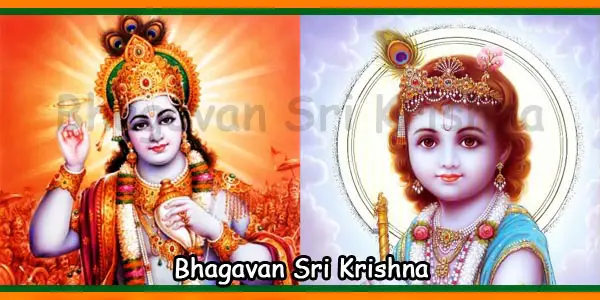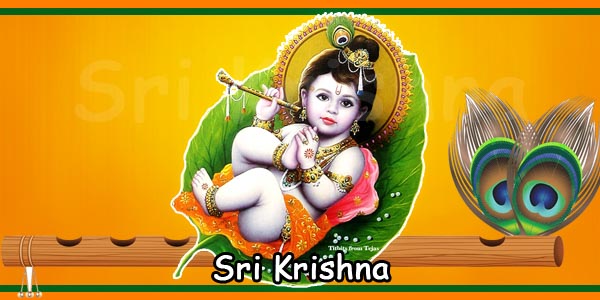Many people may ask, “Who is Krishna?” There are numerous Vedic references that can be used to provide the proper explanations.
To begin with, it is the Vedic literature that most clearly reveals the nature and identity of the Absolute Truth or Supreme Personality. One such reference is the first and second verses of the Vedanta Sutras. The first verse states simply that “Now one should enquire into the Brahman.” This means that now that you have attained a human body, you should use your intelligence to discover what is really spiritual and what is the Absolute Truth. In no other form of life does the living being have such an opportunity. The second verse begins to explain what is this Absolute Truth: “He from whom everything originates is the Absolute.” Thus, as it refers to “He”, the source of all that exists, the ultimate point of creation is a person.

The Rig-veda (1.154.4-5) continues: “Him whose three places are filled with sweetness and imperishable joy, who verily alone upholds the threefold, the earth, the heaven, and all living beings. May I attain to His well-loved mansion where men devoted to God are happy. For there springs the well of honey in Vishnu’s highest step.”
As explained in the Caitanya-caritamrita (Adi. 2.106), Lord Krishna is the original primeval Lord, the source of all other expansions. All the revealed scriptures accept Sri Krishna as the Supreme Lord. Furthermore (Cc.Adi 2.24-26), it goes on to relate that Lord Krishna Himself is the one undivided Absolute Truth and ultimate reality. He manifests in three features, namely the Brahman (all-pervading spiritual energy), Paramatma (Supersoul in all beings) and Bhagavan (the Supreme Personality). The Svetasvatara Upanishad (5.4) also relates that the Supreme Being, Lord Krishna, is worshipable by everyone, the one adorable God, repository of all goodness, ruler of all creatures, born from the womb [in His pastime of Lord Krishna], for He is eternally present in all living beings [as Supersoul]. Furthermore, it states (3.8), “I have realized this transcendental Personality of Godhead who shines most brilliantly like the sun beyond all darkness. Only by realizing Him one goes beyond the cycle of birth and deaths. Absolutely there is no other means to get God-realization.”
The Svetasvatara Upanishad (5.6) further elaborates that Lord Krishna is the topmost of all the gods. “He is the most esoteric aspect hidden in the Upanishads which form the essence of the Vedas. Brahma knows Him as the source of himself as well as the Vedas. The gods like Shiva and the seers of the ancient, like Vamadeva rishi realizing Him, ever became dovetailed in His service and therefore they naturally became immortal.” And in (6.7) it continues: “Let us take our final resort at Him who is the Transcendent and the only adorable Lord of the universe, who is the highest Deity over all the deities, the Supreme Ruler of all rulers–Him let us know as the Paramount Divinity.”
The GopalaTapani Upanishad, which is about Gopala or Krishna, is quite clear on this point, and naturally has numerous verses that explain the nature of the Absolute Truth and Lord Krishna. A few of such verses include the following: “Brahma with his full awareness emphatically said, ‘Sri Krishna is the Supreme Divinity. (1.3) He who meditates on Sri Krishna, serves Him with unalloyed devotion and [makes His transcendental senses gratified by engaging one’s own spiritual senses in] rendering service to Him–all of them become immortal and attain the perfection of life. (1.10) Sri Krishna is that Supreme Divinity as the Paramount Eternal Reality among all other sentient beings and the Fountain source of consciousness to all conscious beings. He is the only reality without a second but as a Super soul dwelling in the cave of the hearts of all beings He rewards them in accordance with their respective actions in life. Those men of intuitive wisdom who serve Him with loving devotion surely attain the highest perfection of life. Whereas those who do not do so never gain this highest beatitude of their lives. (1.22) … This Sri Krishna who is most dear to you all is the cause of all causes. He is the efficient cause of the creation of the universe as well as the superintending force for propelling the jiva souls. Therefore, although He is the enjoyer as well as the Lord of all sacrifices, He is ever atmarama, self-satisfied.” (2.17)
So, summarily, as it is explained and concluded in a variety of Vedic texts, Lord Krishna is the Supreme Personality of Godhead. In other words, as it is said in Sanskrit, krsnas tu bhagavan svayam (Bhagavata Purana 1.3.28), Krishna is the source of all other incarnations and forms of God. He is the ultimate and end of all Truth and philosophical inquiry, the goal or end result of Vedanta. He is the all attractive personality and source of all pleasure for which we are always hankering. He is the origin from which everything else manifests. He is the unlimited source of all power, wealth, fame, beauty, wisdom, and renunciation. Thus, no one is greater than Him. Since Krishna is the source of all living beings, He is also considered the Supreme Father and source of all worlds. He is shown with a blue or blackish complexion. This represents absolute, pure consciousness, which also is unconditional love. Krishna is the embodiment of love. He is also sat-chit-ananda vigraha, which means the form of eternal knowledge and bliss, for which we are all seeking.
The reason why the Lord is called “Krishna” is explained in a book known as the Sri Caitanya Upanishad, which is connected with the Atharva-veda. In verse twelve it is explained: “These three names of the Supreme Lord (Hari, Krishna and Rama) may be explained in the following way: (1) ‘Hari’ means ‘He who unties [harati] the knot of material desire in the hearts of the living entities’; (2) ‘Krishna’ is divided into two syllables ‘krish’ and ‘na’. ‘Krish’ means ‘He who attracts the minds of all living entities’, and ‘na’ means ‘the supreme transcendental pleasure’. These two syllables combine to become the name ‘Krishna’; and (3) ‘Rama’ means ‘He who delights [ramayati] all living entities’, and it also means ‘He who is full of transcendental bliss’. The maha-mantra consists of the repetition of these names of the Supreme Lord.” In this way, Krishna’s names represent His character and qualities, which, in this case, means the greatest and all attractive transcendental pleasure.

So, as we further our investigation of the identity of Sri Krishna in the Vedic literature, we find that they are full of descriptions of Lord Krishna as the Supreme Being. These actually can help us understand the nature of God regardless of which religion we may affiliate ourselves with. So it is encouraged for anyone to study these Vedic texts to increase one’s understanding of God and spiritual reality. If we are expected to understand God, then who better to explain His qualities and characteristics than
Himself? So in the Bhagavad-gita, Krishna provides the Self-revelatory truth about His position in His explanations to Arjuna. There are numerous verses in this regard, of which the following are but a few: “And when you have thus learned the truth, you will know that all living beings are but part of Me–and that they are in Me, and are Mine. (4.35) The sages, knowing Me to be the ultimate purpose of all sacrifices and austerities, the Supreme Lord of all planets and demigods, and the benefactor and well wisher
of all living entities, attain peace from the pangs of material miseries. (5.29) Of all that is material and all that is spiritual in this world, know for certain that I am both its origin and dissolution.” (7.6)
“I am the source of all spiritual and material worlds. Everything emanates from Me. The wise who perfectly know this engage in My devotional service and worship Me with all their hearts.” (Bg.10:8) Going on to the Srimad-Bhagavatam, Lord Krishna specifically explains that before, during, and after the creation, there is always Himself that exists. “Brahma it is I, the Personality of Godhead, who was existing before the creation, when there was nothing but Myself. Nor was there the material nature, the cause of this creation. That which you see now is also I, the Personality of Godhead, and after annihilation what remains will also be I, the Supreme Lord.” (Bhag.2.9.33)
The Brahma-samhita (5.40) explains how the Brahman is but Sri Krishna’s physical brilliance: “I worship Govinda, the primeval Lord who is endowed with great power. The glowing effulgence of His transcendental form is the impersonal Brahman, which is absolute, complete and unlimited, and which displays the varieties of countless planets with their different opulences in millions and millions of universes.”
From the small amount of Vedic evidence that is supplied herein, it is clear that Lord Krishna’s name, form, pastimes, etc., exist eternally in the spiritual dimension and are never affected by even a tinge of the material energy. Thus, He can appear as often and whenever He likes as He is, or in any form He chooses within this material manifestation. He is completely and totally spiritual for He is the Absolute Truth. As the Vedanta Sutras explain, the Absolute Truth is He from whom all else manifests. Thus, the Absolute Truth is the ultimate Person known as Sri Krishna.
Synonyms:”Absolute Being”, “All Knowing”, “All Powerful”, Creator, “Divine Being”, Father, God, Godhead, “Holy Spirit”, “Infinite Spirit”, “King of Kings”, Krishna, Lord,
Maker, Shastra, Supreme, Vedas, Vedic, daemon, deity, demigod, demon, divinity, holiness, idol, master, mover, numen, omnipotent, power, prime, providence, soul,
spirit, totem, tutelary, “universal life force”, “world spirit”
